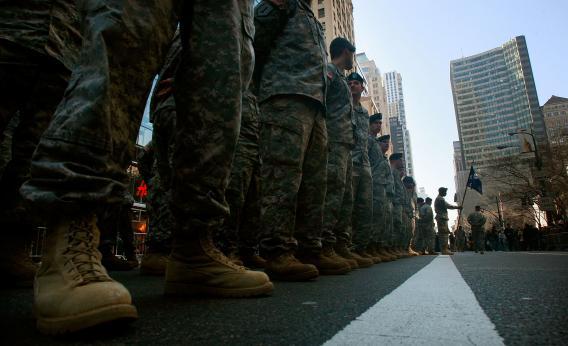Original post, 9:43 a.m.:
I’m camping out at today’s Senate Armed Services Committee hearing about sexual assault in the military, which will include testimony from military leaders and victims’ advocates. Seven separate bills have been introduced in the Senate to grapple with sexual assault since March—six of which have been introduced by female senators.
The crux of the issue here is whether or not to take prosecutions out of the chain of command, which some military commanders worry would diminish their authority within their ranks. At the start of the hearing, committee chair Sen. Carl Levin stressed that legitimate change can only come from within the chain of command:
The military services are hierarchical organizations: the tone is set from the top of that chain, the message comes from the top, and accountability rests at the top. But addressing a systemic problem like sexual assault requires action by all within the chain, and especially by the commanders of the units. Only the chain of command can establish a “zero tolerance” policy for sexual offenses. Only the chain of command has the authority needed to address any problems with command climate that foster or tolerate sexual assaults. Only the chain of command can protect victims of sexual assaults, by ensuring that they are appropriately separated from the alleged perpetrators during the investigation and prosecution of a case. And only the chain of command can be held accountable if it fails to change an unacceptable military culture.
Update, 11:00 a.m.:
Military leaders were very forthcoming in their testimony in admitting they are not doing enough to prevent and respond to sexual assault. Still, almost all of those testifying respectfully argued that the chain of command is necessary to hold perpetrators accountable and retain the structure of authority in units.
“We have failed to address these crimes in a compassionate, just and comprehensive way,” said Army chief of staff Gen. Raymond Odierno, but went on to say that making commanders less responsible in sexual assault cases “will not work.”
Levin then asked what other resources victims of sexual assault have at their disposal. One leader cited Unit Victim Advocates, or UVAs, who are lower-ranking service members tasked with dealing with sexual assault issues within their unit. But a 2009 report by the Defense Department’s task force on sexual assault in the military advised the department to delegate victims’ advocate duties to citizens, since service members aren’t experts in sexual assault despite receiving training.
From the report:
Victims have expressed concern about commanders obtaining information from VAs regarding their case. During focus groups Service Members stated they felt the UVAs were inexperienced and uninformed. Removing the VAs from the battalion/brigade level may help allay some of these fears.
Update, 12:44 p.m.:
Sen. Claire McCaskill roundly criticized military leaders for conflating sexual assault with a “crime of lust,” saying sexual assault needs to be treated as any other type of violent assault among service members. One of her frustrations was that sexual harassment gets lumped in with rape, particularly in gender relations surveys that service members take.
McCaskill said one question about unwanted sexual contact is too vague because it “includes sexual harassment, unhealthy work environment, and rapists.” According to McCaskill, the vague wording of the question hinders data collection efforts to track rape. But question phrasing matters! As seen with university sexual assault surveys, the wording of the question can deter respondents from reporting sexual harassment, and using more vague words like “unwanted sexual contact” vs. “rape” can coax out more truthful answers.
Update, 4:06 p.m.:
The second panel of the day consisted of secondary military leaders and was not very illuminating. The tl;dr version of the testimony is that grassroots cultural change is underway within the military—we just have to give it time to get there. Sen. Kirsten Gillibrand put her head in her hands in frustration at one point, as those testifying repeatedly cited vague fixes like one military unit watching The Invisible War as an example of marked cultural change.
While it’s unsurprising the crowd in the hearing room has thinned considerably since this morning’s headlining testimony, what struck me was that only one of the military members who testified—202nd Military Police Group Col. Donna W. Martin—stuck around to hear civilian victims’ advocates testify.
Correction, June 5, 2013: This post originally misidentified Col. Donna W. Martin as Air Force Col. Jeannie M. Leavitt.
